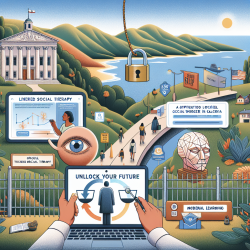We congratulate you on your decision to become a Licensed Clinical Social Worker (LCSW)! The path to licensure as a mental health professional in California is a rewarding journey that requires attention to many details. This guide will provide a summary of the requirements for licensure, as well as tips to help you navigate the process successfully.
About the Board of Behavioral Sciences (BBS)
The Board of Behavioral Sciences (BBS) is the state entity that regulates LCSWs in California. It also oversees individuals gaining hours of supervised experience toward LCSW licensure. BBS regulates Licensed Marriage and Family Therapists (LMFTs), Licensed Professional Clinical Counselors (LPCCs), and Licensed Educational Psychologists (LEPs). However, it does not regulate students who are gaining a degree in social work.
The Board's mission is to protect and serve Californians by setting, communicating, and enforcing standards for safe and competent mental health practice. To achieve this, the Board develops and administers licensure examinations, investigates consumer complaints and criminal convictions, responds to changes and trends in the mental health profession, and creates informative publications for consumers, applicants, and licensees.
Staying Connected with BBS
Throughout your path to licensure, it is critical to remain up to date on various requirements, as laws and processes change from time to time. To stay informed, you can:
- Sign up for email alerts from BBS.
- Follow BBS on social media (Facebook and Twitter).
- Periodically check the BBS website for updates.
Overview of the Path to Licensure
Below is an overview of the steps to LCSW licensure. Each step will be explained in more detail throughout this guide.
- As a Student: Ensure you are enrolled in a degree program that California will accept toward licensure.
- Additional Coursework: You may need to complete additional coursework prior to submitting an application to the Board.
- Upon Graduation: Submit an application for registration as an Associate Clinical Social Worker (ASW) to earn the required 3,000 hours of supervised work experience.
- Gaining Experience Hours: Register as an ASW, be supervised by a qualified supervisor, receive weekly supervision, and meet other legal requirements.
- California Law and Ethics Exam and ASW Renewal: Take the Law and Ethics Exam and renew your ASW number annually.
- Applying for Licensure and the Clinical Exam: Once you have gained all your supervised work experience and completed any required additional coursework, submit an Application for Licensure and take the Clinical Exam.
Educational Requirements
Your first step toward becoming an LCSW in California is earning a master's degree in social work (MSW) from a school accredited by the Council on Social Work Education (CSWE). Verify your school's accreditation on CSWE's website.
If your degree was earned out-of-state, you must complete a 12-hour course in California Law and Ethics prior to registration as an ASW.
Associate Clinical Social Worker (ASW) Registration
Upon graduation, apply to become an ASW and begin gaining hours of supervised work experience. You must register as an ASW within 90 days of graduation to start accruing hours immediately.
ASWs must work under a qualified supervisor, comply with legal requirements, and renew their registration annually. To renew, you must pay a fee, meet the California Law and Ethics Exam requirement, and complete three hours of continuing education in California Law and Ethics.
Gaining Supervised Work Experience
To qualify for licensure, you need 104 weeks of supervision and 3,000 hours of supervised work experience. Here are some tips:
- Always renew your ASW registration on time.
- Keep track of important documents, such as Experience Verification forms and weekly logs.
- Meet with your supervisor every week.
- Understand the categories of acceptable experience and employment laws.
Applying for Licensure and the Clinical Exam
Once you have completed your supervised experience, additional coursework, and passed the California Law and Ethics Exam, submit an Application for Licensure. Upon approval, you can sign up for the Clinical Exam. If you pass, you may apply for your initial LCSW license.
Your LCSW license will expire every two years. Each renewal cycle, you must complete 36 hours of continuing education, including six hours specific to law and ethics, and pay a renewal fee.
For more information, please follow this link.










